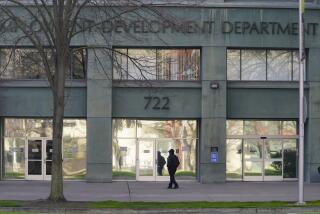Couple Plead No Contest to Welfare Fraud
- Share via
GLENDALE — In the first successful use of a state law allowing authorities to seize assets of welfare cheats, prosecutors have secured felony convictions against a Glendale couple charged with bilking the government of more than $100,000 while they were able to afford a tour of Europe.
Rafik Sinai, 47, and his wife, Lida Zeynalvand, 39, pleaded no contest last week in a downtown Los Angeles Superior Court to two counts each of welfare fraud and grand theft for defrauding a variety of public assistance programs, prosecutors said.
Under an agreement with authorities, Sinai will be sentenced later this month to 16 months in state prison. His wife will be placed on probation but will be required to begin paying $135,000 in restitution to the county, said Deputy Dist. Atty. Gloria Katz.
“I think this is a fair outcome,” she said. The state prison sentence was sought, she said, because the crime involved “an organized, planned effort to defraud the county. And the fact that it garnered prison time should be a message to anyone who is contemplating doing the same thing.”
Since 1987, the Sinai family received welfare benefits in the form of Aid to Families with Dependent Children, food stamps, Medi-Cal and Section 8 housing vouchers, court records show.
Over the same period, documents also show Sinai was employed at a Glendale structural engineering firm while he and his wife owned several vehicles and amassed cash in excess of federal limits for support programs.
Prosecutors cited a 1997 European family vacation as evidence they were living well beyond the level of people who deserved to collect welfare. Among the items seized as evidence was a photo album highlighting a tour of European sites including Stonehenge, the Roman Colosseum, the Eiffel Tower and the canals of Venice.
Until last year, prosecutors could use the state’s asset forfeiture law only to seize proceeds from narcotics trafficking.
But under a new legal provision known as the aggravated white-collar crime enhancement, assets can now be taken to pay fines or restitution to victims of large-scale real estate, insurance and welfare fraud as well as embezzlement and theft.
The law, which went into effect in January 1997, allowed authorities to confiscate $50,000 in U.S. currency seized from the Sinais when they were arrested last March. The money will be applied to the $135,000 the Sinais owe the county.
“This is the first time this statutory scheme has been used in a welfare fraud case in California,” said Stephen L. Cooley, head of the district attorney’s Welfare Fraud Unit. “We hope to use it often in the future as we continue to pursue major welfare fraud cases. . . . It’s become another arrow in our quiver to attack this prevalent problem.”
Prosecutors contend the Sinai case represents the continuing effort to crack down on sophisticated and major welfare fraud violators. Thus far, a dozen investigators are pursuing those cases countywide, Cooley said.
In one of the largest cases now pending in Los Angeles County Superior Court, prosecutors have accused Anatoliy and Ella Rekechenetskiy of Los Angeles of illegally obtaining more than $100,000 in welfare benefits. The Rekechenetskiys owned a bakery and investigators seized more than $250,000 from bank accounts and in cash from their Hollywood home, prosecutors said.
Authorities began investigating the Sinai family last August when they received a letter signed by a group that called itself “Citizens Against Welfare Fraud.”
“Welfare fraud affects all of us, the taxpayers, and those who commit the fraud often abuse the system to the fullest,” said the letter. It went on to tell how Sinai had been in business for 10 years and received checks issued to his sister’s daughter.
The sender of the letter has never been identified and no such group has been located.
The Sinai family’s lawyer, Richard E. Nahigian, could not be reached for comment Tuesday. But at their arraignment, he argued that currency seized from the couple belonged to a relative living in Iran.
Cooley rejected that argument, calling it “a case of the truly greedy taking from the truly needy.”
More to Read
Sign up for Essential California
The most important California stories and recommendations in your inbox every morning.
You may occasionally receive promotional content from the Los Angeles Times.













